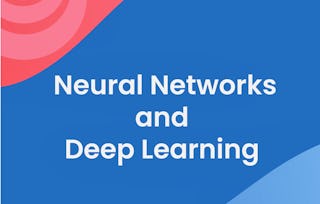Une introduction au domaine de l'apprentissage profond, y compris les réseaux neuronaux, les réseaux neuronaux convolutifs, les réseaux neuronaux récurrents, les transformateurs, les modèles génératifs, la compression des réseaux neuronaux et l'apprentissage par transfert. Ce cours profitera aux carrières des étudiants en tant qu'ingénieur d'apprentissage automatique ou scientifique des données.

Deep learning

Deep learning
Ce cours fait partie de Spécialisation Analytique des données et Deep learning


Instructeurs : Gady Agam
4 645 déjà inscrits
Inclus avec
34 avis
Expérience recommandée
Compétences que vous acquerrez
- Catégorie : IA générative
- Catégorie : Évaluation de modèles
- Catégorie : Keras (bibliothèque de réseaux neurones)
- Catégorie : Réseaux adversoriels génératifs (GAN)
- Catégorie : Apprentissage par transfert
- Catégorie : PyTorch (Bibliothèque d'Apprentissage automatique)
- Catégorie : Traitement du langage naturel (NLP)
- Catégorie : Vision par ordinateur
- Catégorie : Déploiement du modèle
- Catégorie : Deep learning
- Catégorie : Intelligence artificielle et apprentissage automatique (IA/ML)
- Catégorie : Réseaux neuronaux convolutifs
- Catégorie : Réseaux neuronaux récurrents (RNN)
- Catégorie : Analyse d'images
- Catégorie : Architecture de réseau
- Catégorie : Réseaux neuronaux artificiels
- Section Compétences masquée. Affichage de 5 compétence(s) sur 16.
Détails à connaître

Ajouter à votre profil LinkedIn
32 devoirs
Découvrez comment les employés des entreprises prestigieuses maîtrisent des compétences recherchées

Élaborez votre expertise du sujet
- Apprenez de nouveaux concepts auprès d'experts du secteur
- Acquérez une compréhension de base d'un sujet ou d'un outil
- Développez des compétences professionnelles avec des projets pratiques
- Obtenez un certificat professionnel partageable

Il y a 9 modules dans ce cours
Bienvenue au Deep learning ! Dans le module 1, nous allons faire une introduction au Deep learning. Le Deep learning est une branche de l'apprentissage automatique qui s'appuie sur les réseaux de neurones artificiels. Il est capable d'apprendre des modèles et des relations complexes au sein des données. En particulier, nous discuterons du réseau de neurones profonds feed-forward. Nous aborderons également la rétropropagation - la manière d'optimiser les réseaux de neurones profonds.
Inclus
9 vidéos7 lectures4 devoirs1 sujet de discussion
Dans le module 2, nous aborderons les réseaux neuronaux convolutifs (CNN). Un CNN, également connu sous le nom de ConvNet, est un type spécialisé d'algorithme d'apprentissage profond principalement conçu pour les tâches qui nécessitent la reconnaissance d'objets, y compris la classification, la détection et la segmentation d'images. En particulier, nous discuterons des couches importantes dans les CNN, telles que la convolution, la mise en commun. Nous montrerons également différentes applications des réseaux neuronaux (CNN).
Inclus
6 vidéos5 lectures4 devoirs
Dans le module 3, nous fournirons d'importants conseils pratiques sur le Deep learning, notamment le choix de la fonction d'activation, les méthodes d'apprentissage par descente de gradient adaptative, la régularisation et le décrochage.
Inclus
7 vidéos7 lectures5 devoirs
Dans le module 4, nous aborderons les Réseaux de neurones récurrents (RNN) qui sont utilisés pour les données réseau séquentielles. Le RNN est un type de réseau de neurones dans lequel la sortie de l'étape précédente sert d'entrée à l'étape actuelle. Nous aborderons en particulier la version Vanila des RNN et la Mémoire court terme et long terme (LSTM). Nous aborderons également les problèmes d'apprentissage des RNN.
Inclus
8 vidéos5 lectures4 devoirs
Dans le module 5, nous aborderons les modèles génératifs. En particulier, les réseaux antagonistes génératifs (GAN) et les modèles de diffusion (DM). Les réseaux antagonistes sont une façon d'entraîner un modèle génératif en formulant le problème comme un problème d'apprentissage supervisé avec deux sous-modèles : le modèle générateur que nous entraînons pour générer de nouveaux exemples, et le modèle discriminatif qui tente de classer les exemples comme vrais ou faux. Les DM sont des chaînes de diffusion de Markov permettant d'ajouter lentement du bruit aléatoire aux données, puis d'apprendre à inverser le processus de diffusion pour construire des échantillons de données souhaités à partir du bruit.
Inclus
7 vidéos4 lectures3 devoirs
Dans le module 6, nous aborderons un puissant modèle de Deep learning - le transformateur. Le transformateur est un composant de réseau neuronal qui peut être utilisé pour apprendre des représentations utiles de séquences ou d'ensembles de points de données. Le transformateur a été à l'origine d'avancées récentes dans le traitement du langage naturel, la vision par ordinateur et la modélisation spatio-temporelle.
Inclus
8 vidéos4 lectures3 devoirs
Dans le module 7, nous aborderons la compression des réseaux neurones. La compression de modèle réduit la taille d'un réseau neurones sans compromettre la précision. Cette réduction de taille est importante car les réseaux neurones plus volumineux sont difficiles à déployer sur des appareils aux ressources limitées.
Inclus
7 vidéos5 lectures4 devoirs
Dans le module 8, nous aborderons l'apprentissage par transfert. L'Apprentissage par transfert est une technique d'apprentissage automatique qui réutilise un modèle développé pour une tâche donnée comme point de départ d'un nouveau modèle pour accomplir une nouvelle tâche. En particulier, nous discuterons du réglage fin, de l'apprentissage multitâche, de l'apprentissage adverbial de domaine et de l'apprentissage zéro coup.
Inclus
6 vidéos5 lectures4 devoirs
Ce module contient l'évaluation sommative du cours qui a été conçue pour évaluer votre compréhension du matériel du cours et votre capacité à appliquer les connaissances que vous avez acquises tout au long du cours.
Inclus
1 devoir
Obtenez un certificat professionnel
Ajoutez ce titre à votre profil LinkedIn, à votre curriculum vitae ou à votre CV. Partagez-le sur les médias sociaux et dans votre évaluation des performances.
Préparer un diplôme
Ce site cours fait partie du (des) programme(s) diplômant(s) suivant(s) proposé(s) par Illinois Tech. Si vous êtes admis et que vous vous inscrivez, les cours que vous avez suivis peuvent compter pour l'apprentissage de votre diplôme et vos progrès peuvent être transférés avec vous.¹
Instructeurs


Offert par
En savoir plus sur Algorithmes
 Statut : Essai gratuit
Statut : Essai gratuit Statut : Essai gratuit
Statut : Essai gratuit Statut : Essai gratuit
Statut : Essai gratuitDeepLearning.AI
 Statut : Essai gratuit
Statut : Essai gratuit
Pour quelles raisons les étudiants sur Coursera nous choisissent-ils pour leur carrière ?

Felipe M.

Jennifer J.

Larry W.

Chaitanya A.

Ouvrez de nouvelles portes avec Coursera Plus
Accès illimité à 10,000+ cours de niveau international, projets pratiques et programmes de certification prêts à l'emploi - tous inclus dans votre abonnement.
Faites progresser votre carrière avec un diplôme en ligne
Obtenez un diplôme auprès d’universités de renommée mondiale - 100 % en ligne
Rejoignez plus de 3 400 entreprises mondiales qui ont choisi Coursera pour les affaires
Améliorez les compétences de vos employés pour exceller dans l’économie numérique
Foire Aux Questions
Pour accéder aux supports de cours, aux devoirs et pour obtenir un certificat, vous devez acheter l'expérience de certificat lorsque vous vous inscrivez à un cours. Vous pouvez essayer un essai gratuit ou demander une aide financière. Le cours peut proposer l'option "Cours complet, pas de certificat". Cette option vous permet de consulter tous les supports de cours, de soumettre les évaluations requises et d'obtenir une note finale. Cela signifie également que vous ne pourrez pas acheter un certificat d'expérience.
Lorsque vous vous inscrivez au cours, vous avez accès à tous les cours de la spécialisation et vous obtenez un certificat lorsque vous terminez le travail. Votre certificat électronique sera ajouté à votre page Réalisations - de là, vous pouvez imprimer votre certificat ou l'ajouter à votre profil LinkedIn.
Oui, pour certains programmes de formation, vous pouvez demander une aide financière ou une bourse si vous n'avez pas les moyens de payer les frais d'inscription. Si une aide financière ou une bourse est disponible pour votre programme de formation, vous trouverez un lien de demande sur la page de description.
Plus de questions
Aide financière disponible,

